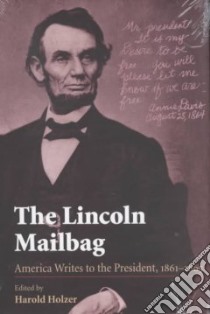The Lincoln Mailbag - 9780809320721
Un libro in lingua di Holzer Harold (EDT) edito da Southern Illinois Univ Pr, 1998
- € 23.50
- Il prezzo è variabile in funzione del cambio della valuta d’origine
During his four years in the White House, Abraham Lincoln received between 250 and 500 letters a day?not only correspondence from public officials, political allies, and military leaders but from ordinary Americans of all races who never knew the president yet nonetheless felt the urge to share their views with him.
Harold Holzer, the editor of Dear Mr. Lincoln: Letters to the President, dips once again into Lincoln's bulging mailbag to assemble and annotate a volume of letters, many of them never-before-published, that the American people wrote to their president during the Civil War?correspondence that offered praise, criticism, advice, threats, abuse, and appeals for help and for special favors from men and women throughout the country.
Significantly, this collection may be more representative of the mood of the country at the time than Lincoln might have known; it includes letters from black Americans, originally routed to the War Department's Colored Troops Bureau, that Lincoln never saw. Ed D. Jennings, who simply wanted clarification of his status, writes: "Some Reckon and others guess But what I wish to know is this, what do you mean to do with us Col[ore]d population are we to suffer and our enemies reap or can we Reap now I was brought up a farmer and if I can have a hut in my own native land and a little help that will suffice me."
"At a single reading," Holzer notes in his preface, Lincoln's staff "might handle: requests for political appointments (they might come from an ex-President, a New York archbishop, even Lincoln's own minister); suggestions for how better to manage the war; requests for autographs, locks of hair, and personal appearances; presumptuous political advice; rhymes, hymns, epistles?and on one occasion, sixteen pages of vicious abuse in verse?from amateur poets; and gifts and tokens that included food, drink, clothing, pictures, and sculptures."
Holzer has rescued these voices?sometimes eloquent, occasionally angry, often poignant, at times poetic?from the obscurity of the archives of the Civil War. The letters, of course, speak for themselves, but Holzer's introduction and annotations provide historical context for events and people described as well as for those who wrote so passionately to their president in Lincoln's America.
Informazioni bibliografiche
- Titolo del Libro in lingua: The Lincoln Mailbag
- Sottotitolo: America Writes to the President, 1861-1865
- Lingua: English
- Autore: Holzer Harold (EDT)
- Editore: Southern Illinois Univ Pr
- Collana: Southern Illinois Univ Pr (Hardcover)
- Data di Pubblicazione: 01 Gennaio '98
- Genere: HISTORY
- Pagine: 236
- Dimensioni mm: 254 x 165 x 31
- ISBN-10: 080932072X
- EAN-13: 9780809320721


